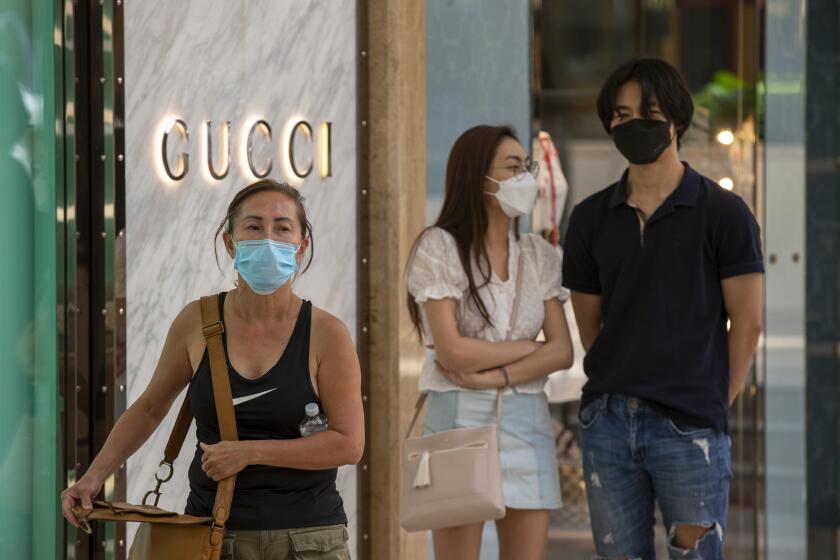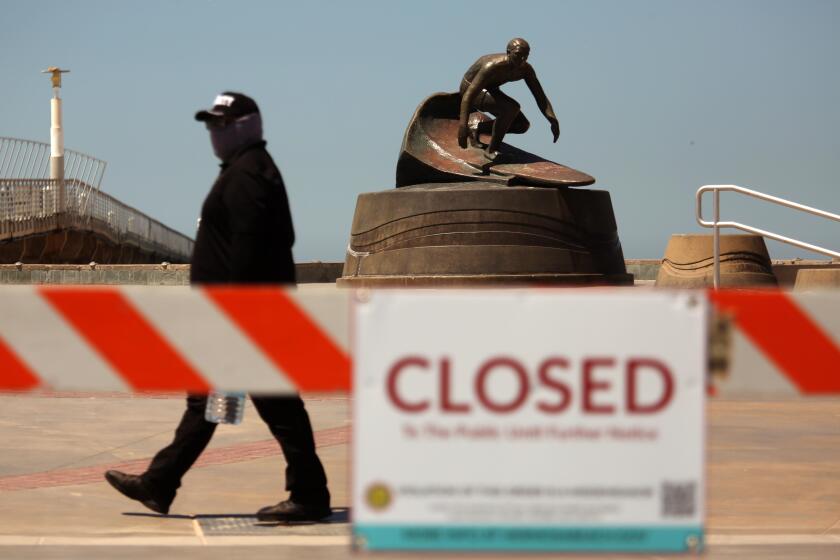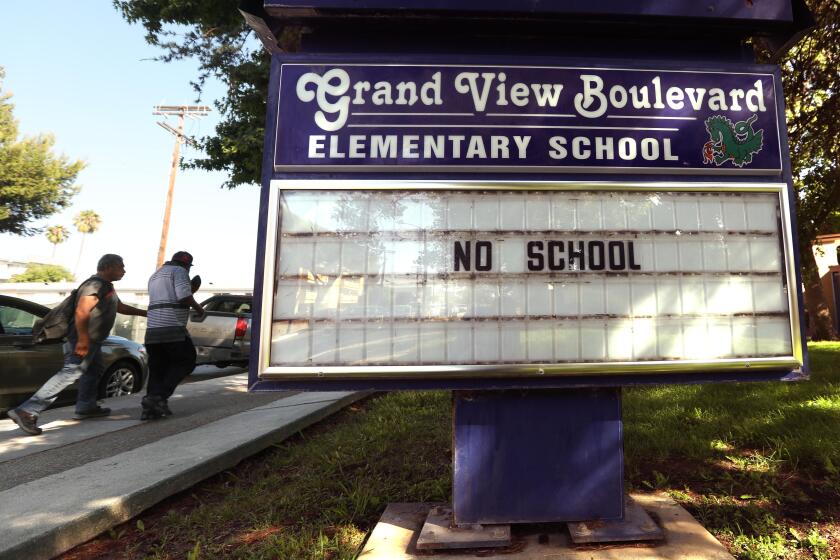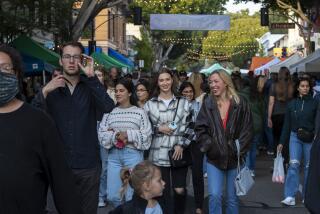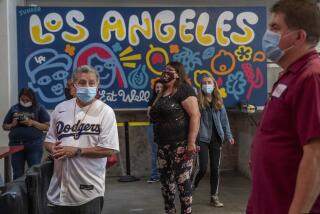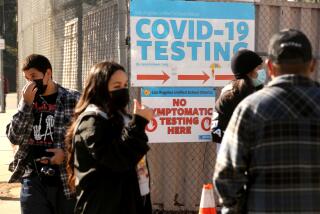Newsom orders statewide reclosure of indoor dining, limits on church services, salons

- Share via
SACRAMENTO — California is largely closing again amid a spike in COVID-19 cases across the state, as Gov. Gavin Newsom announced statewide restrictions Monday to again halt all indoor dining and close bars, zoos and museums.
At the same time, most counties, including Los Angeles, San Bernardino, Orange and Riverside, will be forced to shutter gyms, houses of worship, hair salons, malls and other businesses under the new order, which is effective immediately and remains in effect indefinitely. In addition, offices with nonessential workers in those counties must close.
The move further pushes Californians back into their homes during a time when they are typically enjoying summer vacations. The stricter measures to close gyms, churches and other services affect 29 counties that are among the most populous in the state, where 80% of California residents live.
“This virus is not going away anytime soon,” Newsom said Monday. “I hope all of us recognize that if we were still connected to some notion that, somehow, when it gets warm, it’s going to go away or, somehow, it’s going to take summer months or weekends off — this virus has done neither.”
Cases of coronavirus in California and rates of hospitalizations have risen sharply in the last month as stores reopened and residents ventured back outside, albeit with restrictions to wear masks in public places.
The new order halts indoor dining and shutters bars statewide. Counties hardest hit by the coronavirus are seeing additional closures.
The setback comes after the state said June 12 that dine-in restaurants, retail stores, bars, religious services and gyms could reopen with modifications in counties that met the state’s guidelines. Newsom said the move Monday to resurrect tough restrictions was a response to a rise in COVID-19 hospitalizations in the state.
“We’re seeing an increase in the spread of the virus, so that’s why it’s incumbent upon all of us to recognize soberly that COVID-19 is not going away any time soon until there is a vaccine or an effective therapy,” Newsom said Monday.
As of Monday, California had seen more than 333,000 confirmed cases of COVID-19 and more than 7,000 deaths, according to the Los Angeles Times’ tracker.
California averaged 8,211 new cases a day of COVID-19 during the past week. The previous week, the average was 7,876.
Newsom has routinely highlighted the growing number of infections, even as the state was moving forward with reopening the economy, including giving the green light to nail salons, tattoo parlors and massage therapy facilities, which are some of the highest-risk sectors for transmissions. Last month, Newsom issued orders requiring all Californians to wear masks or other face coverings while in public or in high-risk settings.
Then, ahead of the July 4 holiday, Newsom set limits on indoor activities for counties hit by a spike in infections. Counties are placed on a watch list after three days of rising hospitalization rates, increasing community transmission or declining hospital capacity.
There are now 29 counties on that watch list, which, with Monday’s announcement, will have to close gyms, houses of worship, offices with nonessential workers, malls, nail salons and hair salons. Kern County fell off the watch list Monday, while Placer, Sonoma, Yuba and Sutter counties were added.
The latest order is creating a patchwork of closings and reopenings statewide, spreading confusion in some quarters. In the Bay Area, Santa Clara started reopening gyms and other services Monday but will have to close them Wednesday. The governor said Monday that the orders are likely to soon apply to Alameda County, given current trends.
No tattoos. No touch ups. No Pilates. No God. It’s Lockdown 2.0, SoCal style.
Newsom said counties are likely to come on and off the watchlist, which he said allows the state to operate with a “dimmer switch” to modify restrictions as needed. But for businesses affected by the closures again, the new orders are economically devastating and emotionally jarring, said Fiona Hutton, president of an eponymous statewide public affairs firm based in Los Angeles. Hutton said businesses can’t simply open and close with the switch of a button.
“Everyone is frustrated with the on/off switch in their personal and professional lives,” Hutton said.
Under the statewide order, all dine-in restaurants must close unless they seat patrons outdoors or offer takeout. In addition, wineries and tasting rooms, movie theaters, card rooms, zoos, museums, bowling alleys, miniature golf centers and other family entertainment sites will be closed across California. Bars and breweries can continue to serve beverages outdoors, only if accompanied by food.
Because of the spike in coronavirus cases, Los Angeles public school campuses will not reopen for classes Aug. 18 and will remain shut indefinitely.
Indoor protests are barred, but not outdoor ones. Hours after Newsom’s announcement, one group of anti-mask advocates posted plans to protest the restrictions this weekend outside the Capitol.
The state’s public health department said the types of businesses targeted in Monday’s order have a higher risk of spreading the coronavirus “because they promote mixing with others outside of one’s household.” Other sectors are included because they are not able to adhere to the state’s mask order; for example, while eating or drinking inside a restaurant or bar.
The order says the new restrictions will remain in effect until the state’s public health officer, Dr. Sonia Angell, determines that it is appropriate to reverse course. The order, signed by Angell, also says “Californians should not travel significant distances and should stay close to home.” However, new travel restrictions are not in place.
“The decisions we make today will determine how COVID-19 impacts our communities and families tomorrow,” Angell said in a statement.
School districts will continue to determine whether to return to classrooms following summer break, a decision that has varied widely across California. On Monday, the Los Angeles Unified and San Diego Unified school districts announced that they would not reopen classrooms and will continue with online learning until further notice.
Even while overriding county public health orders across the state, Newsom said Monday that school districts are best positioned to determine whether to reopen classrooms. However, he cautioned that the state is monitoring schools and will continue to provide guidance on best practices.
“The dynamic nature of the spread of this virus means you’ll be hearing a lot more in the next few days, and presumably weeks, as we get closer to the opening of the school year,” Newsom said.
More to Read
Sign up for Essential California
The most important California stories and recommendations in your inbox every morning.
You may occasionally receive promotional content from the Los Angeles Times.
